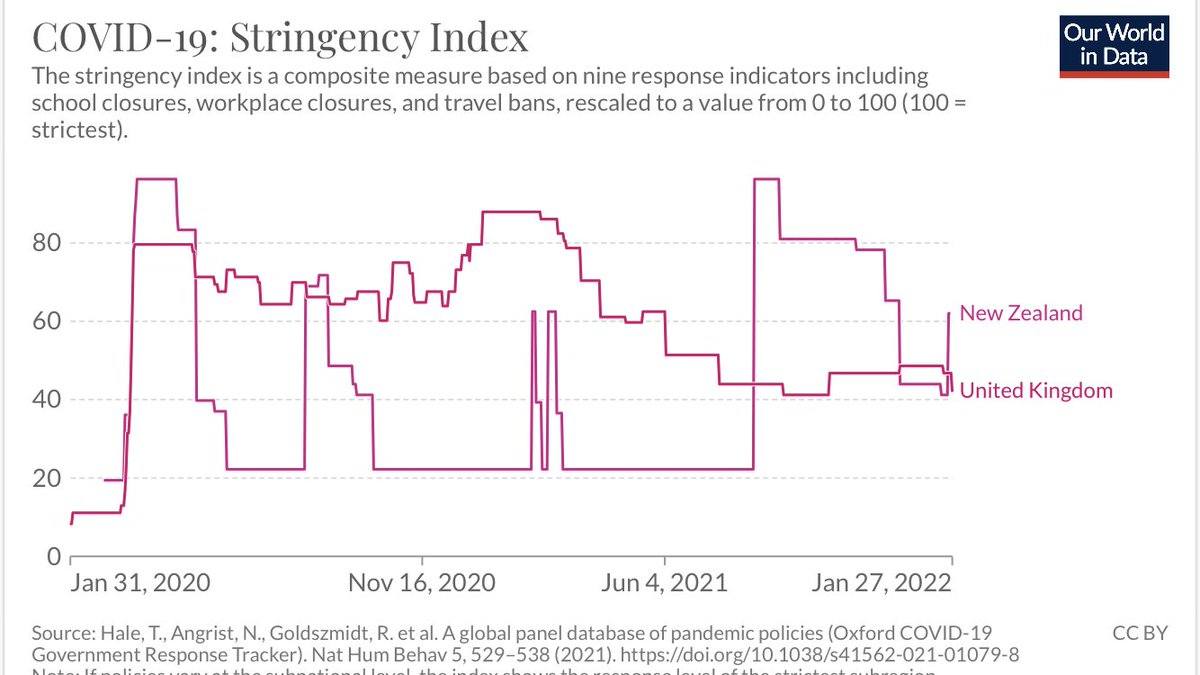
If we are moving to a new phase in the pandemic - vaccines, treatments and an “acceptable” death toll - success will depend on:
1. The state of healthcare services
2. Trust in Leadership
Worrying for some countries…
🧵
1. The state of healthcare services
2. Trust in Leadership
Worrying for some countries…
🧵
Firstly, what is success:
1. Minimise death and disability from the virus
2. Minimise death and disability from other health conditions - maintain other services!
3. Protect livelihoods and mental health of the population.
1. Minimise death and disability from the virus
2. Minimise death and disability from other health conditions - maintain other services!
3. Protect livelihoods and mental health of the population.
Vaccines…
…have been hugely successful. we would be in a completely different, dystopian world without them. And even though their effects wane, the protection from severe disease holds on longer. And new vaccines will be even better, IMV.
…have been hugely successful. we would be in a completely different, dystopian world without them. And even though their effects wane, the protection from severe disease holds on longer. And new vaccines will be even better, IMV.
Anti-virals…
… hold real hope of being able to manage the vast majority of high risk cases via GP/Outpatients. This may put Covid alongside bacterial chest infections…treat it early enough and prevent severe disease. Miss it = pneumonia!
… hold real hope of being able to manage the vast majority of high risk cases via GP/Outpatients. This may put Covid alongside bacterial chest infections…treat it early enough and prevent severe disease. Miss it = pneumonia!
Disease modifying agents. These are treatments that reduce the inflammatory response typifying severe disease. Steroids were a game changer! We are still awaiting dose-response studies of this cheap treatment [@JeremyFarrar] but they are a rescue for severe disease.
1. Health Service Capacity.
All of these interventions depends on one thing: ACCESS TO HEALTHCARE!
Mortality in Covid is strongly associated with access to healthcare. And indeed affects post-Covid disability (a proportion of Long Covid).
All of these interventions depends on one thing: ACCESS TO HEALTHCARE!
Mortality in Covid is strongly associated with access to healthcare. And indeed affects post-Covid disability (a proportion of Long Covid).
So that’s the good news! It is entirely achievable to drive down the morbidity and mortality from Covid. And many countries already have by simply improving access to healthcare.
But…
But…
…some countries will struggle to provide good access to care. The UK is a good, bad example. The vast majority of healthcare is provided by a national health service that has underwent years of shrinkage. And during the pandemic the NHS was shrunk further.
And the effects are all too clear:
1. a massive increase in deaths at home, that continues.
2. Waiting times for ambulances, admissions and elective care have hit record highs…
3. And primary care is under the greatest pressures it has ever faced
1. a massive increase in deaths at home, that continues.
2. Waiting times for ambulances, admissions and elective care have hit record highs…
3. And primary care is under the greatest pressures it has ever faced
The lack of investment in frontline healthcare means the UK is not ready for the “next phase” of this pandemic.
The healthcare rationing typifying the UK response to Covid is set to continue.
As things stand, certainly the first two criteria of success will not be met!
The healthcare rationing typifying the UK response to Covid is set to continue.
As things stand, certainly the first two criteria of success will not be met!
2. Trust in leadership.
For vaccines to work they must actually be taken. Trusting one’s government is likely one of the greatest determiners of vaccine uptake. Note the dramatic fall in booster uptake during the last month in the UK. And the distrust in the US Trump-era.
For vaccines to work they must actually be taken. Trusting one’s government is likely one of the greatest determiners of vaccine uptake. Note the dramatic fall in booster uptake during the last month in the UK. And the distrust in the US Trump-era.
In part it is bad examples, it’s the “it’s mild” narrative, and it’s the one rule for them another for us pattern. In part it’s the track record. In part it’s the lack of support to the public.
Uptake for anti-virals will be similar.
Uptake for anti-virals will be similar.
Conclusion
Maximal suppression until multi-variant vaccines and anti-virals are globally accessible remains the least harmful approach, IMO.
It may also give us time to learn more about Long Covid.
But poorly managed restrictions have soured many against such endeavours.
Maximal suppression until multi-variant vaccines and anti-virals are globally accessible remains the least harmful approach, IMO.
It may also give us time to learn more about Long Covid.
But poorly managed restrictions have soured many against such endeavours.
If then, a nation chooses to permit viral transmission, healthcare capacity remains pivotal. While some gain may be possible with innovations, it is resourcing the frontline that is the rate-limiting factor in “success”. Primary care and urgent secondary care are the priorities!
At the very least Covid is likely to double the healthcare burden from pneumonia - already the highest burden infectious disease in the world. Every countries healthcare capacity needs to grow to match that, immediately! Or face more rationing of care.
As for the trust in governments, people know when leaders are concerned with their health and when they are more concerned with their own success. Hopefully we get better at choosing the former!
Finally, new variants are almost certain. Spikes and waves of infections likely too. We must get better at managing/preventing these or healthcare access will just keep falling and rationed care worsening.
Access to healthcare!!!!
Access to healthcare!!!!
• • •
Missing some Tweet in this thread? You can try to
force a refresh








